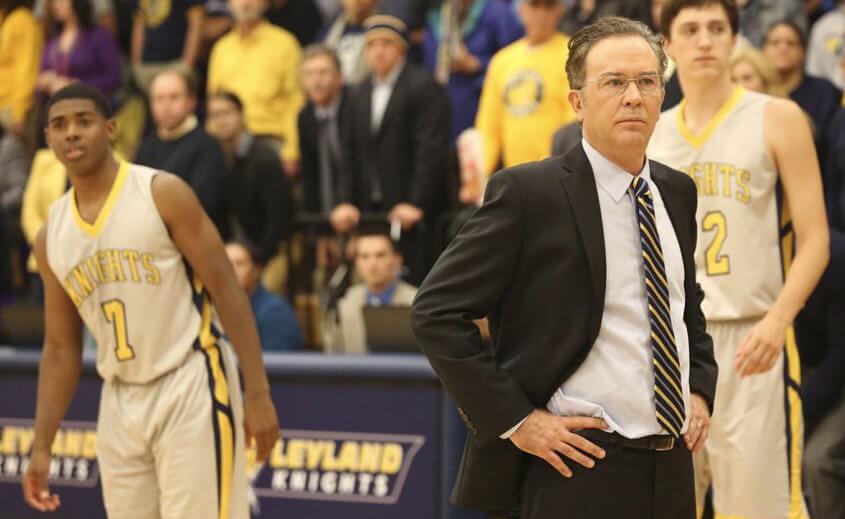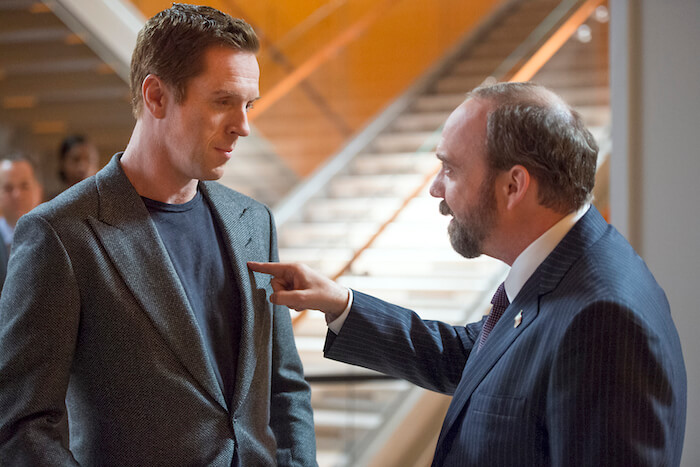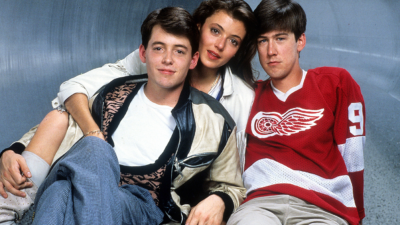Crime Stories: Billions and American Crime Give a Topical Twist to TV’s Sturdiest Genre
 Billions
Billions
Season 1, Showtime, Sundays through March 27
American Crime
Season 2, ABC, Wednesdays through March 9
Crime is television’s safe haven. Although the crime procedural’s status as an industry staple may have made it somewhat resistant to innovation—the gloriously formulistic Law & Order remains the single most successful crime series ever—the genre has nevertheless evolved. Crime TV has been shaped by the social trends of different eras, from radical activism to countercultural solitariness to white-flight-era grit to self-aware feminism. Stylistically, Hill Street Blues was a leap forward in realistic ensemble drama in the 1980s, Homicide: Life on the Street a step-change in character-driven programming in the 1990s. Groundbreaking crime drama has been the signature development of the second “golden age” of television now underway because sharp TV writers have probed the deeper psychology of the criminal and/or his pursuer—yielding, most notably, The Sopranos, Breaking Bad, and True Detective’s first season (the second season is best forgotten). They have also tackled the sociology of crime. Here The Wire is the standout.
Lately, the financial crisis has heightened interest in white-collar crime, while political polarization and resurgent social tensions have intensified concerns about race, gender, and criminality. Showtime’s Billions and ABC’s American Crime, an anthology series, embody these phenomena. Both, however, caricature reality. The essentially satirical Billions reflects an awareness of its excess; the resolutely earnest American Crime does not. Snarkiness notwithstanding, though, these two shows are among the most ambitious small-screen efforts to address white-collar crime and social justice, respectively.
Billions, in which just about everyone is audaciously repellent, pits Damian Lewis’s Yonkers-raised and Hofstra-educated Bobby Axelrod, a ruthless up-from-the-streets hedge-fund prodigy, against Paul Giamatti’s Manhattan-raised and Ivy League-educated Chuck Rhoades, a ruthless US attorney born with a silver spoon in his mouth. In many ways, the series is contrived and vulgarly self-indulgent—Rhoades is saddled with his rich corporate lion of a father’s reputation for slick calculation and into S&M (including golden showers), while Axelrod has deployed Axe Capital’s Cantor Fitzgerald-like decimation on 9/11 to ennoble his lucre. But the two fine actors elevate the material both in set-piece amusements (e.g., Rhoades’s bullying a lazy schlub to pick up his dog’s shit with his hands while Rhoades walks his own canine on the Brooklyn Heights Promenade) and as drivers of plot.
Each main character saves his most meticulous and considered connivance for the other. This constitutes a kind of mutual respect, and illustrates a rude synergy between the two testosterone-charged cultures of Wall Street and high-end law-enforcement. Here they operate with the appearance of enmity. But the point that Billions seems to be making, four episodes in anyway, is that it’s only a veneer, and that Wall Street’s substantial impunity for the 2008 financial crisis suggests that the real substance and object of their elaborate dance is reciprocally reinforcing cooperation. Although that is not a terribly profound or even original observation, it may be more or less true, and is worth emphasizing and developing dramatically.
Straightforward truth is more elusive in American Crime. The first season is race-baiting hyperbole, and invites hate-watching. Two estimable actors—Timothy Hutton and Felicity Huffman—are burdened with frontloaded, unnuanced roles as the divorced parents of a white middle-class drug addict and dealer who appears to have been murdered by a black junkie and his white girlfriend. The former’s character is a feckless ex-degenerate gambler with a decent heart, the mother’s a long-suffering single mom whom the trauma transforms into an obsessively reactionary racist. Just to make sure the kitchen sink is full, the writers make the suspect’s sister (Regina King, defiantly excellent as usual) a Black Muslim separatist who insists on his innocence and his girlfriend a love-addled white middle-class addict who might have killed the ironically kindred victim herself. This little network—in particular, the none-too-subtle folie à deux—is supposed to be a microcosm of America, but it’s too tendentious to be convincing.
The ongoing second season, which involves the alleged homosexual rape of a white student—sensitively and credibly played by Connor Jessup—at a party held by the basketball team of an integrated charter school, is much better. Huffman’s (new) character, headmaster of the charter school, is still archly over-the-top: a viciously smarmy and calculating demon with a permanent smile. But Hutton as the blinkered basketball coach and King as the strident and defensive mother of a black student implicated in the rape ring truer. Untangling the moral web the show weaves and setting things right, though, seems improbable: people like Huffman’s headmaster inevitably surface to undo the enterprise. Where rectitude is a knowingly cynical façade for cutthroat advancement in Billions, in American Crime it’s a genuine but unattainable desideratum. The right and the good are either illusory or out of reach; crime, blue collar or white, is life. In reaching this postmodern cul-de-sac, the two shows between them may be onto something, however grim.
You might also like 
























